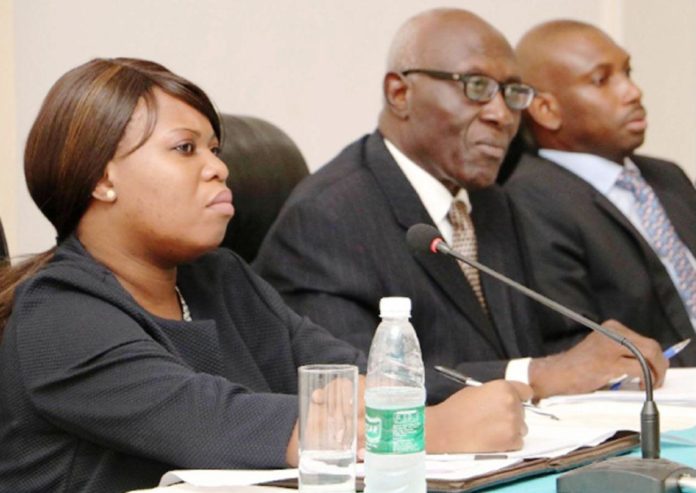By Mamadou Dem
Several officials of the National Telecom Company Gamtel and its subsidiary Company Gamcel, yesterday appeared before the ‘Janneh’ Commission in connection to the management of Gamtel International Gateway Project.
The General Manager of Gamcel Elizabeth Mendy-Johnson, while testifying before the Commission said, the reason for partnering with the international telecom company MGI, was because of their support in the area of roaming, noting that their partnership was for development project.
She recalled that from the agreement, she knew that an amount should be paid but from her understanding, MGI would not ask for payment; that MGI deducted the sum of $1, 093,600 for roaming.
Mrs. Johnson said she could not remember the list of all who attended the meeting in Switzerland and the cost involved, further stating that Gamcel has not gained any significant in terms of development.
She however adduced that Gamtel owned Gamcel and they appoint managers as well, further stating that they are trying to compete and that competition depends on what you could offer.
She told the Commission that she could not remember the lowest revenue collected but Gamtel operated at a loss; that when the contract with MGI was stopped, they could not bill their customers and they had to go back to their billing system
She narrated that they needed the most sophisticated billing system to make it more vibrant and up to standard, further stating that they needed to pay MGI $1.7 million after the termination of their contract.
She however said no action was taken to negotiate for the payment of this amount but that they were trying to see if they could budget for another billing system.
The Director of IT at Gamtel/Gamcel Seedy Ceesay, also appeared before the Commission in connection to the MGI project.
He said he is based at the Gamcel office and said both Companies contributed to their budget; that from August 2017 to date, he has been working with Gamcel.
According to him, as the Managing Director of co-network at the time, he was involved in the switching of networks, noting that he has never set his eyes on MGI switches despite being a member of the management team of the Gateway, and did not know where their switch was located. He said he did not have any connection to the switches of MGI but was involved in the billing system and they were to integrate their switches to MGI and this was authoritised by the then MD.
However, he said he was involved in one MGI project, ie the Gamcel billing system, further indicating that they had a meeting in Switzerland to discuss the bypass fraud but the loss was not discussed.
Mr. Ceesay told the Commission that they discussed at the meeting that they needed to have a server, stating that MGI was responsible for detecting the fraud, since they were managing the International Gateway Project.
“It is not a fraud on our side but on the International Gateway,” he told the Commission.
At this juncture, Counsel Bensouda asked him why Gamtel had difficulties in the operation of the system after taking over from MGI. In response, Ceesay said he did not know why the system was not working and that he did not know what MGI did on the system.
He told the Commission that they called experts but the system was not working, disclosing that he did not know anything about the sum of over $1million deducted by MGI.
Mr. Sarjo Khan, the Director of Customer Care Services at Gamcel also gave evidence on the same subject matter.
Earlier, Mr. Ousman Jobarteh, the Deputy Managing Director of the Gambia Ports Authority, also reappeared before the commission to shed light on the exportation of timber by Westwood Company. Joberteh told the Commission that he knew the said Company which was involved in the exportation of timber, bound for China.
He disclosed that he had a record of how many containers the Company exported to China, revealing that the Company exported in 2014, 15,106 containers, while in 2012 they exported 19,747 containers; that these were timber logs.
At this juncture, documents relating to the summary of the activities of the Company were tendered and admitted in evidence.
When asked how the Company was introduced to GPA, he said the agency they were dealing with, gave them a letter as the sole exporter of timber. Mr. Jobarteh went on to say that according to the letter the Company, they were authorised to export timber; that Westwood brought a scanner stationed at GPA, to scan containers and is currently operating and under their custody.
Next to testify was the former Deputy Director of Agricultural Engineering Service Ousainou Jobe and the current officer in charge of the unit at the Ministry of Agriculture, Mustapha Minteh.
Both were summoned in connection to John Deere tractors and they explained how they were assembled and distributed under executive directives.
Mr. Jobe said they assembled 78 tractors and there was a team from South Africa; that the tractors were left at MSA garage and the Ministry asked him to be responsible for them.
He informed the Commission that the tractors were left at the garage for one year and letters came from the Ministry for the tractors to be stationed at the garage.
According to him, 334 farming implements were handed over by the office of the former president; that after the handing over, instructions came for the supply of the tractors.
He stated that up to 2015, 55 tractors were distributed and 13 were left at the MSA garage; that it was one Siaka who was responsible for MSA and the tractors were handed over to him.
Mr. Jobe further told the Commission that Generals Tamba and Badjie gave instructions to distribute the 55 tractors but was quick to say that most of the tractors were received by Kanilai Family Farms and they were told that the tractors should be given out on hire.
He informed the Commission that two tractors were taken to the exiled former president’s mother’s farms in Bujinga; that they were made to understand that the tractors were bought by SSHFC, and that those who were hiring the tractors did not pay for their services.
At this juncture, a summary of the distribution of the tractors were tendered and admitted as exhibits.
Sitting continues today.



















